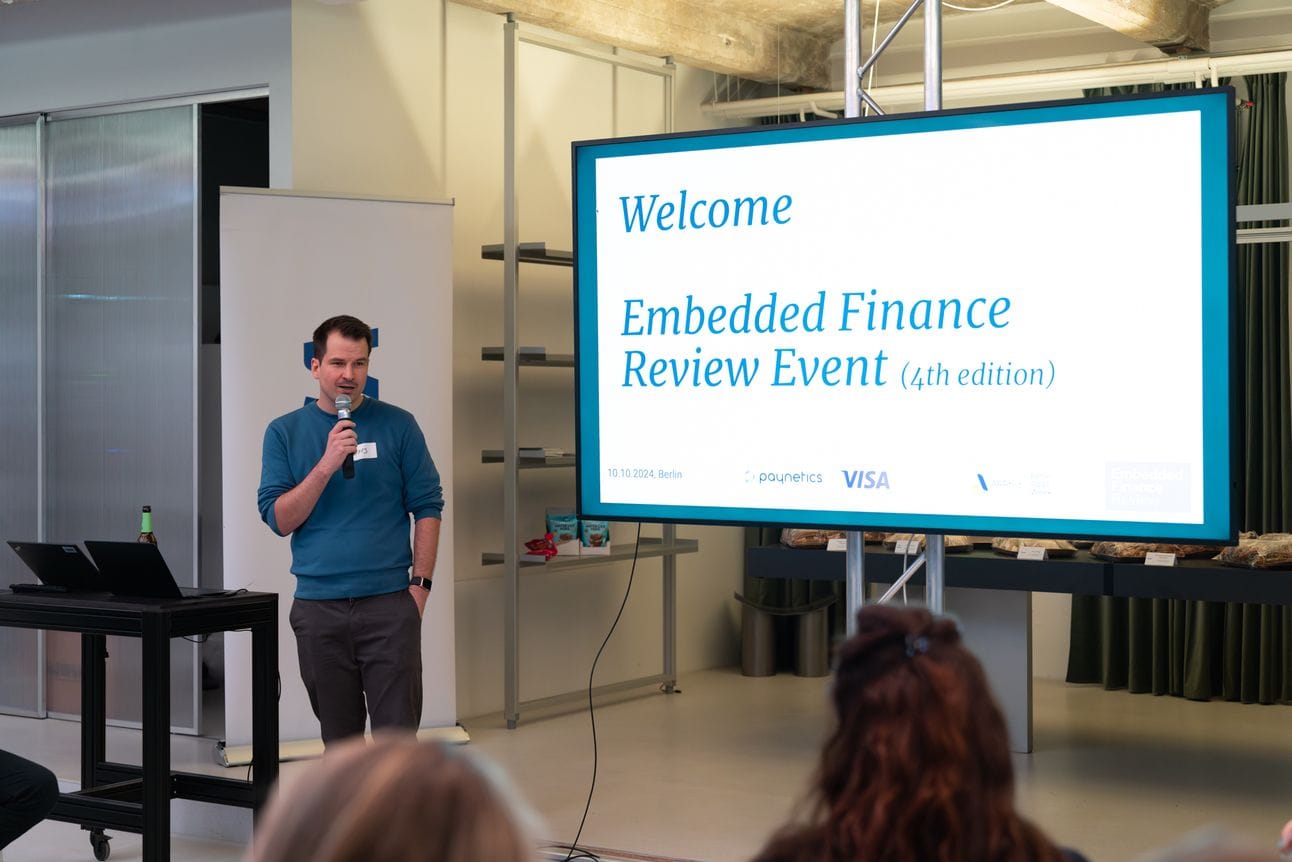This newsletter went out to {{active_subscriber_count}} subscribers
Hi {{first name|embedded finance friend}}
Last week, I shared my embedded finance slide deck with you and received lots of good feedback and interesting comments. In case you missed it, I have included a link at the end of this newsletter. I have also started working on something I call the European Banking Infrastructure Provider Map. If this sounds interesting, please ping me and I can share a sneak peek.
Also, I am revisiting the topic of monetisation of my newsletter and podcast. A quick recap: I started including advertisements from my newsletter tool (see below) a couple of weeks ago. These built-in ads have nothing to do with embedded finance and only offer a pay-per-click model. I make on average $23 per edition. Additionally, I have two active premium subscribers (Thanks Dirk and Ezequiel 🙂) who pay for the newsletter with absolutely nothing in return ($5 per month or $50 per year).
I was able to spend more time on Embedded Finance Review during the quiet summer. But if I want to continue to do that, I need to increase revenue. Sponsorship and premium subscription are the two most logical ones. So my asks for you are:
- Sponsorship: If you are interested in discussing this in more detail, please ping me. In case you want to see some numbers first, have a look here. Please note that I have not decided anything yet and it might take some more time until I do. But I am keen to understand who is generally interested.
- Premium subscription: I would love to offer an attractive premium subscription package. But it is important to me that this weekly newsletter will remain free. This means I need to create something new that subscribers could pay for. Content is the obvious one, but I am not a big fan of paywalls. What else could be interesting? Any ideas?
And next weekend, I will be switching my fintech for a food hat and supporting my wife’s snack startup at a food fair in Hamburg. Because of that, next week’s newsletter will be a bit delayed (either in the afternoon of Tuesday or on Wednesday morning).
And now let’s dive in 👇
Advertisement:
Want SOC 2 compliance without the Security Theater?
- Oneleet is the all-in-one platform for SOC 2 Compliance & Attestation.
- Get the automation software, penetration test, 3rd party audit, and vCISO services in one place!
- Focus on what matters to build real-world security & pass security reviews!
Our Embedded Finance Review event in Berlin last week

Last week, we hosted our 4th Embedded Finance Review Event in Berlin and about 60 embedded finance enthusiasts followed our invitation. Personally, I was very happy to see many new and ‘non-fintech’ faces (LinkedIn for more pictures).
A big thanks to our two sponsors, Paynetics and Visa, for their support and insightful presentations. I kicked things off with a short intro to embedded financing, using my new embedded finance slide deck. After that, each of our sponsors came on stage for their presentations. Unfortunately, our third speaker, Christian Steiger from Lexware Office, had to cancel his trip to Berlin at the last minute.
Since our event was an official partner of Berlin SaaS Week, that influenced many of the discussions. However, there was a second theme: social aid. Just a few days before our event, the final decision of the tender from fourteen German states was announced. The tender was about replacing cash payouts to refugees with a card-based solution (I had covered this before). The winner of the tender is the project SocialCard, which was a team effort by various players, including SecuPay, Publk and Visa (and Paynetics is one of the infrastructure providers in the background). Therefore, we had the right players at the event to talk about this.
Personally, I found most interesting that some municipalities that have introduced the card already were able to a) spend time on activities (e.g., helping find a job or language course) that they haven’t done for years because cash payouts required so much time and b) reduce sick days of employees substantially because cash payouts are often extremely stressful.
I love hosting such events but they require a lot of work. In the days leading up to an event, I often wonder if its worth the effort. But the positive feedback at the event and afterwards (4.9 out of 5 stars with >20 feedbacks) gives me confidence that they are an important part of bringing the fintech and tech community together. That being said, I am eager to host more events in 2025, potentially even more than the usual two events per year. If you are interested in partnering, read this.
Dutch business software provider Exact launches embedded lending offering in partnership with Rabobank

Background: Exact’s cloud software solution includes functionalities from the areas of finance, ERP, and business processes. The company claims to have more than 675,000 customers, from sole-traders and startups to established businesses, with a strong focus on the BeNeLux countries.
Embedded lending launch: Exact has partnered with Dutch bank Rabobank to offer short-term working capital financing for entrepreneurs (Exact). The financing option is available within the user dashboard, where it can be requested for invoices up to 100,000 EUR. Within one working day, Rabobank will make the funds available if approved.
Product landscape: Exact already offered a pay-by-link option where the entrepreneur using Exact can include a link in the invoice that enables their customers to pay conveniently by card or other payment methods. Such features already aim at reducing the time for payment for invoices, but the invoice financing is a step further. I don’t have any further insights, but I am certain that Exact will likely work on other financial features and products already.
Context: Like in many other countries, delayed payments happen frequently to Dutch entrepreneurs; according to Exact, on average, 29% of all invoices are paid after the due date. This causes often challenges for the business owners and having flexible working capital financing available is reducing this stress.
Thanks to subscriber Adrian for highlighting this news story to me!
Is Wolt planning to apply for a bank licence?

What happened: During Sifted’s conference, Wolt’s CEO Miki Kuusi mentioned that Wolt might be applying for a bank licence at some point (Sifted). They have obtained an e-money licence this year after obtaining a payment institution licence back in 2021. These licences are likely helpful for the new digital storefronts that Wolt is working on.
Similar to its owner, Doordash, Wolt plans to enable restaurant owners to create simple landing pages where customers can place orders and pay, potentially helping Wolt to earn payment fees on non-delivery orders. As you can see, Wolt is today already able to provide a wide range of financial products, but cannot offer lending products themselves. Kuusi mentioned that Wolt knows their customers better than any bank and would likely be able to provide the best financing terms to restaurant owners.
Wolt Capital: Coincidentally, Wolt launched Wolt Capital earlier this year when it announced its partnership with German lending infrastructure provider Finmid. Between the steps of making the decision to apply for a bank licence and actually receiving a licence will be a few years; thus, the partnership with Finmid might be the first logical step on this journey to understand customer needs better and offer the right products.
Market landscape: In the past few years, we have seen a number of food platforms launch financing products for restaurant owners. Very often, these providers have a close relationship with the businesses and can often leverage a lot more relevant data than traditional banks. So far, all these platforms have partnered with infrastructure providers (e.g., Banxware or Youlend in addition to Finmid) and avoided being regulated themselves. It will be interesting to see if Wolt is the first one to actually go that route.
Thanks to subscriber Mikko for highlighting this news story to me!
Short news
- Worldline launches an embedded payment product in partnership with Online Payment Platform (OPP). This collaboration offers a suite of features, including support for split payments and escrow services platforms and marketplaces (Finextra)
- German vertical SaaS and Fintech provider Nelly announces a €100 million factoring partnership with an incumbent bank (FinanceFWD). We covered Nelly’s partnership with Adyen and other financial partners in our podcast.
- More bad news from Solaris. After the announcement to shut down its EMI operations in the UK and EU, the German infrastructure banks confirm now additional layoffs at the bank entity (Business Insider).
Lars’ corner
If you missed my Embedded Finance Intro Guide on Thursday, you can find it here again.
If you have any comments, feedback, or thoughts about this Intro Guide or anything else embedded finance-related, just reply to this email.
Somebody forwarded you this email? Subscribe for free.
Are you planning to start your own newsletter? Check out Beehiiv and get 20% off.








